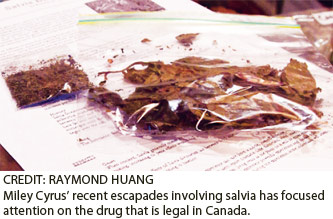Miley Cyrus reignites interest in salvia

VANCOUVER (CUP) — "Everything turns to water — like cell-shaded water, and I fall onto a pirate ship as I'm smoking it. Then I start hallucinating. All of a sudden I'm in the world of Zelda, like the Deku Tree area. And I try to run, but on salvia you can't really move."
These are the words Nick Workman, a University of Western Ontario student, used to describe his first experience with Salvia divinorum, or Diviner's Sage, an entheogenic South American plant that can be legally sold and purchased in Canada. While Workman first tried salvia several years ago, the drug has been gaining users via unconventional channels.
In early December, popular celebrity gossip blog TMZ.com posted a video of Miley Cyrus, former Disney star, smoking from a bong at her 18th birthday party. In the video, the actress slurs and says she wants "more of that shit."
According to TMZ's sources, the "shit" in question is salvia.
Chris Bennett, owner of Vancouver's Urban Shaman, counts salvia among his inventory of shamanic aids, though it's not widely used.
"It was more popular a few years ago," Bennett said. "It's gone through its novelty potential."
The Cyrus video sparked some renewed interest in the drug among an unlikely demographic. "Usually when something like that happens, I get a bunch of older people in, middle- age type people. The kids already know about it," said Bennett, in reference to the Cyrus video.
"Kids" is a broad term, as Bennett does not allow minors into his store. However, the Canadian Alcohol and Drug Use Monitoring Survey study showed that 7.3 per cent of Canadians between 15 and 24 have taken the drug at least once.
The sale of salvia is a grey area. In Canada, the plant is classed as a natural health product, meaning it cannot be sold unless it has been reviewed and authorized by Health Canada, which it hasn't. A loophole in the law allows salvia to be sold openly so long as the consumer is informed that their purchase is not intended for human use.
"To date, Health Canada has not licensed for sale any drug or NHP which contains salvia as an ingredient," said Christelle Legault, a spokesperson for the ministry.
This means that the sale of the plant is largely under the jurisdiction of Health Canada's Health Products and Food Branch Inspectorate. Their enforcement of these laws has been slack, according to a CBC article dated October 19.
Bennett says that salvia is not meant for human consumption.
"Traditionally, it's burned as an incense. It was used as a visionary oracle, so people would consult it with a question and from their vision try and decipher an answer."
Using salvia can be an intense, powerful experience. Salvia trips are a popular topic of discussion in Bennett's store. "I probably talk to more people about those experiences than anything else," he said. "There are a lot of commonalities. A lot of people report they have a vision where everything is made out of Lego or pages of a book."
Bennett himself is not a user of the plant. "I don't really like salvia myself. It's not something I can see myself doing again. I find the loss of identity and personality too overwhelming or something."
Recently, a woman from Burnaby, B.C. shattered her jawbone after jumping out a third-story window while high on salvia. Bennett isn't sure the drug is to blame, comparing the situation to "a drunk person blaming booze for their car accident. With some common sense and some safe precautions — like having somebody there with you — that sort of danger is negated."
According to Legault, "Health Canada is currently assessing whether the regulation of Salvia divinorum � under the Controlled Drugs and Substances Act is warranted."
Given its reputation, it is unlikely that the drug will ever receive approval. Bennett sees this less as a vote for public safety than an act of suppression.
"The biggest concern about salvia is not any proclaimed health effects, it's that, for five minutes, people are having a visionary experience," he said. "It's like our culture somehow fears that sort of thing."













